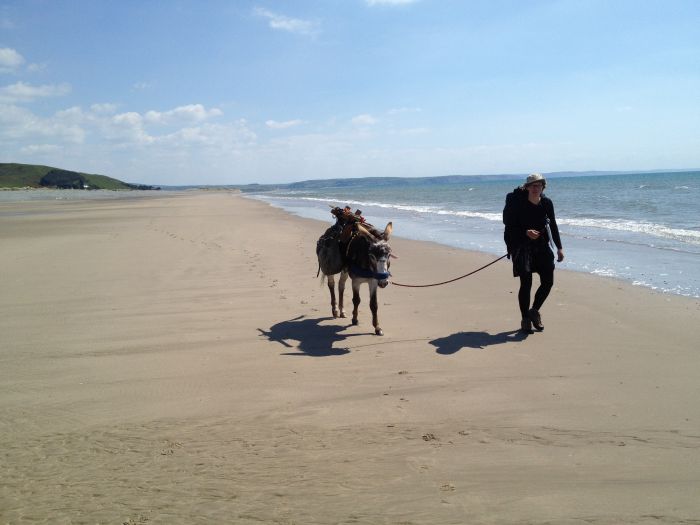Travel writer Hannah Engelberg walked 1,000 miles around Wales – with a donkey called Chico – on a five and a half month trip with a difference. We find out more…
Adventure Travel: What made you decide to walk around Wales… with a donkey?
Hannah EngelKamp: Initially it was that the Wales Coast Path had opened, which was exciting and felt like a catalyst to walk around the country. It’s the only country in the world that has a path around it, so that seemed reason enough. And a couple of weeks later I thought hang on, if I take a donkey, it will be something different, something unusual – and it was.
AT: Did you have any donkey experience before that?
HE: Not at all – in fact, I’d never owned a pet before. So it was quite a shock. I didn’t realise I wasn’t an animal person until I really realised I wasn’t an animal person.
AT: How do you go about buying a donkey?
HE: Not as difficult in some ways as you might expect – you really do just google ‘donkey dealers’ or similar and they exist all over the country, especially places with beaches. So there are plenty of donkeys for sale, but finding the right one was difficult. It quickly became obvious that there was a real pressure to get the right donkey, because the success of the idea was going to rely on the donkey being into it. It was weird having the pressure of getting the right one, but not the knowledge to go about doing it.
AT: What do you have to consider when donkey shopping?
HE: Everyone had different opinions. One person told me that female donkeys tend to be homebodies, and like to stay in their field, so I probably wanted a male donkey. And donkeys apparently bond for life, so you can’t take one away from an existing friend. Once I started walking I realised what people were getting at, and that I had made a bad choice! In some respects it was a bad choice anyway – he was young and too untrained. So we were a funny bunch for a while, the two of us, trying to struggle along. But actually he was a good choice because he was a character, and it worked out all right in the end.
AT: He’s called Chico – did you name him?
HE: No, he was already named. I’ve never met another donkey called Chico but apparently it’s a bit of a standard donkey name, like Rover for a dog.
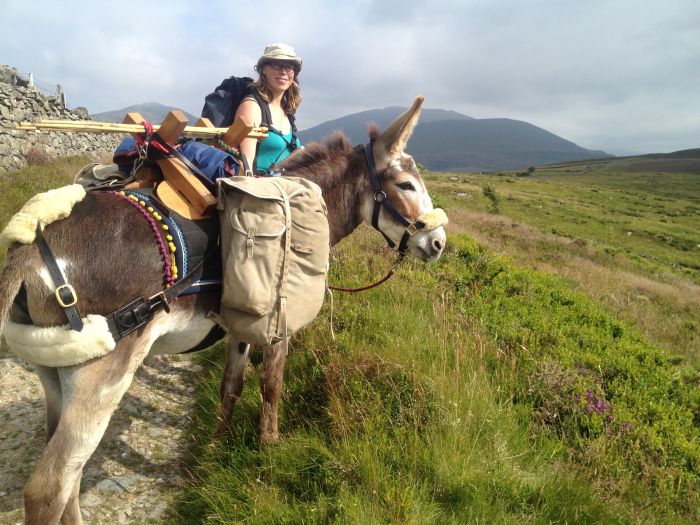
AT: What route did you take for the hike?
HE: I started in Aberystwyth and went clockwise. Aberystwyth is where I’m from and it felt nice to have an adventure that started from my mum’s front door, went all the way around the country and back again.
AT: Did you do any planning?
HE: Because it took so long to find the right donkey, it meant that we set out without much planned in the way of route and accommodation. At first that seemed bizarre. People are quite out of practice at setting out in the morning without knowing where they’re going to sleep at night. So it was a bit of a shock to find myself doing that every day, and with a donkey. But actually Chico made it easier, because nobody wanted to pass up the opportunity to have a donkey stay the night. He was a bit of a meal ticket.
Also, we were walking round an area that is agricultural, and touristy, so that’s a good combination. Farmers weren’t fussed because they’re used to dealing with animal-based situations. And we wild-camped a bit as well, which was easier than you’d expect. Anyone who might have been annoyed by a couple of people camping had their hearts softened by the donkey eyeballing them at dawn as they walked past with their dog.
AT: How did you stop him from escaping at night?
HE: I had an electric fence. At first I thought I would tether him to a stake, but then I realised donkeys don’t like that very much. It felt awkward at the beginning – quite proprietorial – to be fencing off a piece of land, but actually it was fine, and it made a big difference to Chico. He didn’t have much in his life that was the same day to day, so it was clear that it was important to him to know where his space was. He’d know that was his home, that he was off duty, and he could have a roll and a little lie down. After the first couple of weeks I didn’t turn the fence on at all.
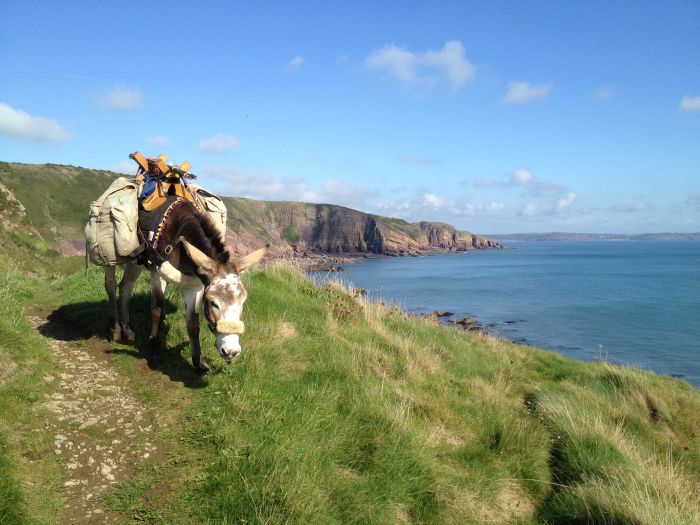
AT: Did having a donkey make the expedition harder or easier?
HE: Very much harder in almost all ways. It took probably twice as long as it would have, if not more. We didn’t go on the coast path at all really, as he can’t do kissing gates and stiles, and we didn’t really start getting on until about half way through the walk, which was very hard on the heart and soul – I felt like I was forcing this animal round the country. He’s too strong for me to pull him along, so every day, every step was a negotiation.
But also it made it a real event. I walked around Anglesey without him, because I was desperate for the progress and he was in need of a break, and I didn’t really meet anyone. It was so undeniably gorgeous, and I enjoyed being outside and walking every day, but in terms of getting a picture of Wales, and the stories of the people, it felt kind of empty.
AT: How did people react when they saw you both?
HE: We got different comments in different places. On the north coast of Wales there were a lot of people shouting “donkey!” from Shrek. In other parts of the country people would shout “nice ass” – that was one of my favourites. And then a lot of people would say, “that’s a big dog.” So he did attract interest, which was what I wanted. It was a good way of meeting people.
AT: Did you ever feel like Shrek?
HE: I haven’t seen Shrek since it came out, so I don’t really remember – I should probably update my knowledge. But there is quite a lot of cultural donkey walking – Robert Lewis Stevenson for example walked with a donkey called Modestine through the Cevennes in France. He was of the era where you were expected to beat your donkey just to get him to walk, so I felt quite glad to not be actually following in his footsteps.
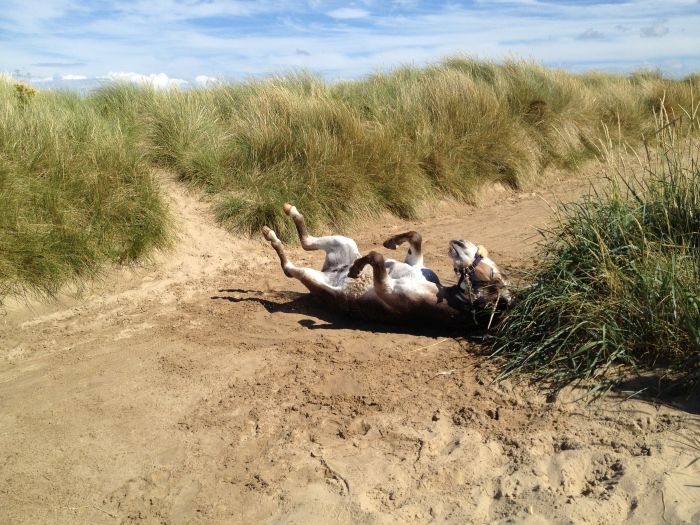
AT: What did you do when Chico wouldn’t walk?
HE: Carrot waggling did next to no good at all. It was a battle of wills. And it didn’t go very well – there were a few weeks about half way through where we made very, very slow progress. We’d be walking all day and probably only go a couple of miles. It’s much easier to walk 25 miles in a day than to walk two miles and take the same amount of time.
AT: Did something change?
HE: Yes. Shortly after those few weeks – like when they say it’s darkest just before dawn – we had a breakthrough. One morning we walked out of that night’s camp spot and the day started with a hill. It wasn’t a very steep hill and it wasn’t very long, but Chico refused to take a single step. We knew each other pretty well by then, so I could tell he wasn’t ailing – he was very fit, very strong and there was no real reason why he was refusing to walk up hills. So I dropped his lead and walked off. I just needed to stride 20 steps so I could get it out of my system before coming back and starting to do battle for another day. And he followed me. I peeked over my shoulder and he was following me up the hill without me having to drag him on his rope. That was the all-time high point of the whole experience.
AT: So he did want to walk really…
HE: I don’t know. It felt like it meant he wanted to do it, or at least like it had stopped being coercion and we had started being a team. But equally you could look at it that I’d broken down everything that he had ever known and all that was the same in his poor life day after day was my face. We certainly have a bond, for sure, forever, but I don’t know whether that’s because he loves me, or because he was just frightened of being left alone in the world. I don’t know if I love him or if I was just flattered that he wanted to be with me.
AT: Did travelling with a donkey feel like you were going back in time?
HE: It did, and people would inform us of it quite often. He’s got a very big pack saddle which was hand-sewn by a local harness-maker and carpenter using his dad’s old tools, so there was something quite old fashioned about it from the start. My mum wanted me to take a llama or a zebra but it was important to me that it wasn’t something flashy or unusual. He definitely was a gimmick, but it wasn’t gimmicky in that way, because the only thing that made it unusual was the passing of about 50 years. Fifty years ago people had a very different relationship with animals. It would have been personal and important and meaningful, but based on totally different aims, not on sentiment but a real partnership.
And also, because we couldn’t walk on the coast path we walked along green lanes and old ways, full of history. There would be occasions when I would suddenly feel that we were walking in the footsteps of two millennia of donkeys and that was really gratifying, really beautiful. It was what it was all about – having that cultural experience of a country, taking the time to walk at that natural speed and appreciating the landscape at a slow pace.
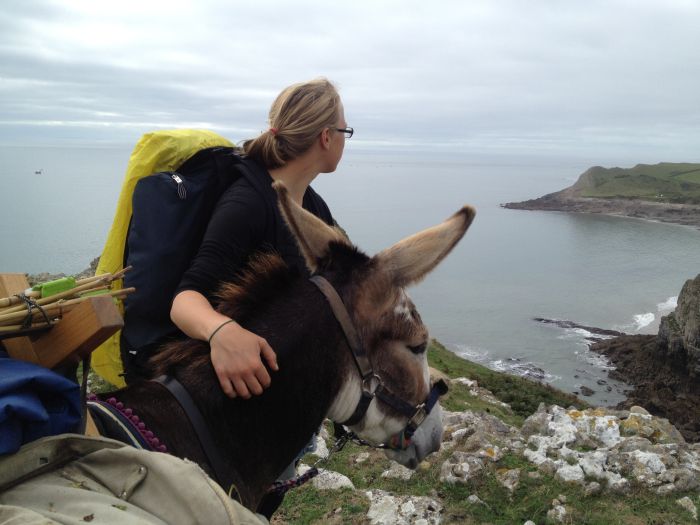
AT: And you made a film of the trip too?
HE: Yes. My boyfriend Rhys is a film-maker, so he was with us for about half of the time. He makes adventure travel films, donkeys are kind of good looking and Wales is very beautiful so it felt an obvious thing to do.
AT: Did the filming add extra complications?
HE: It really did, yes. I enjoy filming, and when I was on Anglesey without the donkey, I found that the camera became a bit of a confidant. But when I had the donkey I just didn’t have enough arms for all of it, so a lot of the footage is a bit grumpy! I felt that the camera was an annoying member of the crew in a way. It’s very difficult to see something beautiful if you’re making a film without feeling that you should be filming it. There were lots of little ways that the filming was almost as much of a drag as the donkey.
AT: What is the film called?
HE: Both the book and the film are going to be called Seaside Donkey. I did think about Hauling Ass, which would have been fun, but it felt a little bit too American. Maybe for the sequel…
AT: What did you do with Chico after the trek?
HE: I’ve still got him. He lives in a field about four miles outside of Aberystwyth. Throughout winter I had to visit him every day to take him hay. I never feel like going but when I do I’m always glad I did.
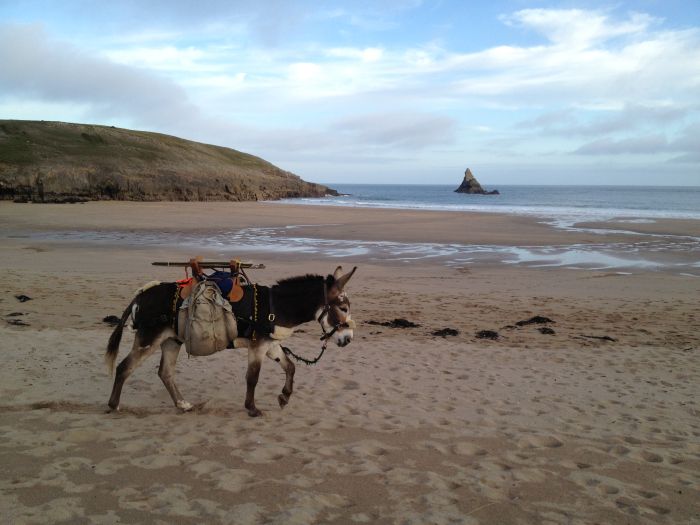
AT: Did you imagine that you’d end up keeping him?
HE: I very quickly knew that I wouldn’t sell him. I’m not ruling out the possibility of him going somewhere else for a long loan at some point, but I think he’ll always be mine.
AT: Do you think you’ll ever do another long walk with him?
HE: Not if I can help it! It’s been a year and a half since we finished and I still feel a bit tired by the whole thing. I wouldn’t mind doing a walk with an animal that I could carry, but you sort of wonder what that would be for.
But I could have gone on and on in terms of the walking. I’m a big fan of walking and camping and living resourcefully, and I like being outdoors because it makes the simple things become the important things – anything you cook tastes incredible, and if you find a public toilet that has hot water it makes your whole day.
The thing that really struck me was that, if I had been going without the donkey, I would have been able to set out the following morning, as long as I had my kit. Before that I had thought that you need to organise a grand adventure, but actually you don’t need to. There was such a joy in making it up as I went along – a real kick. And at some point I’d like to do that again. Just walk out without knowing where I was going.
Hannah’s book and film Seaside Donkey are out now – see www.facebook.com/seasidedonkey.



